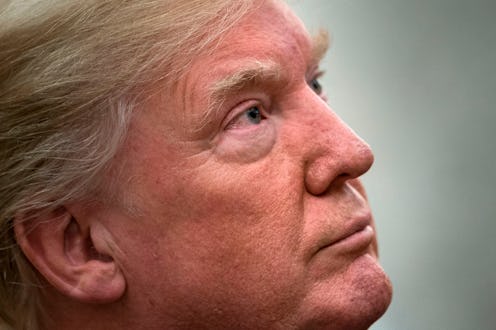News
Trump's Calling Gold Star Families Claim Contradicted By New Report

For days, President Donald Trump has been antagonizing Democratic representative Frederica Wilson, for publicly revealing alleged insensitive comments he made to the grieving widow of a slain U.S. Army sergeant named La David Johnson. He's done this while insisting that as president, he's called "virtually everybody" who's had a family slain in the line of duty. And yet, a new report from John Donnelly of Roll Call suggests quite the opposite: when Trump claimed he called the Gold Star families, the White House reportedly didn't even know the names of all the servicemembers who've been killed this year.
The report, based on emails sent from the White House to the Pentagon and the Pentagon's subsequent response, suggests that Trump administration officials knew right away when Trump made the sweeping statements ― asserting that he had called "virtually" all the Gold Star families throughout his administration, and falsely claiming past presidents had not done so ― that there would be problems.
In short, they were seemingly aware that they'd need to do some clean-up work to add some credibility to his claim. The report states that the White House lacked a complete, current list of all the American servicemembers who'd lost their lives under Trump's tenure, and thus had to quickly and quietly reach out to the Pentagon to try to get the information.
Defense Secretary James Mattis' executive secretary, Capt. Hallock Mohler, reportedly responded to the White House's inquiries in an email titled "Condolence Letters Since 20 January 2017" on the evening of Tuesday, Oct. 17. The email, according to the Roll Call report, detailed the identities and phone numbers of those servicemembers slain since Trump's inauguration.
It's not hard to see why the White House would have been worried about Trump's comments, and subsequently scrambled to make things look right. Since Trump made the incendiary claim, which included a false smear against his predecessors (he claimed "a lot of them didn't make calls," comparing himself favorably to former president Barack Obama), reporters found multiple Gold Star families who received no recognition or personal condolences from Trump.
Trump also politicized the death of the son of White House chief of staff John Kelly, who was slain in Afghanistan in 2011. In the midst of defending his comments about Obama, Trump asserted that the former president did not call Kelly to offer condolences after his son, Robert Michael Kelly, was killed.
Subsequent reporting suggests that Kelly told Trump this story, but didn't expect him to reveal it to the press and the public. He did, nonetheless, defend Trump's response to Sgt. Johnson's widow in a testy press conference on Thursday, attacking Rep. Wilson for remarks she seems to never have made, and remarkably, refusing to take questions from any reporter who didn't personally know a slain soldier or a Gold Star family.
This is essentially a controversy entirely of Trump's own making, the result of his assertion that he'd called virtually all the Gold Star families. It's somewhat obscured the incident that Trump was actually being asked about when he made the claim, however ― the killing of Sgt. Johnson, along with three other soldiers, during a military operation in the African nation of Niger.
it's entirely unclear what the nature of their deployment was ― why, in other words, American troops were in Niger at all ― and it's not known with any precise clarity what events led up to their deaths. According to CNN, Johnson and his team were ambushed by some 50 ISIS-aligned fighters, although Trump himself has not publicly linked the ambush to the militant Islamist group. The attack itself took place on Oct. 4, and the president did not offer any public comment on it for more than a week.